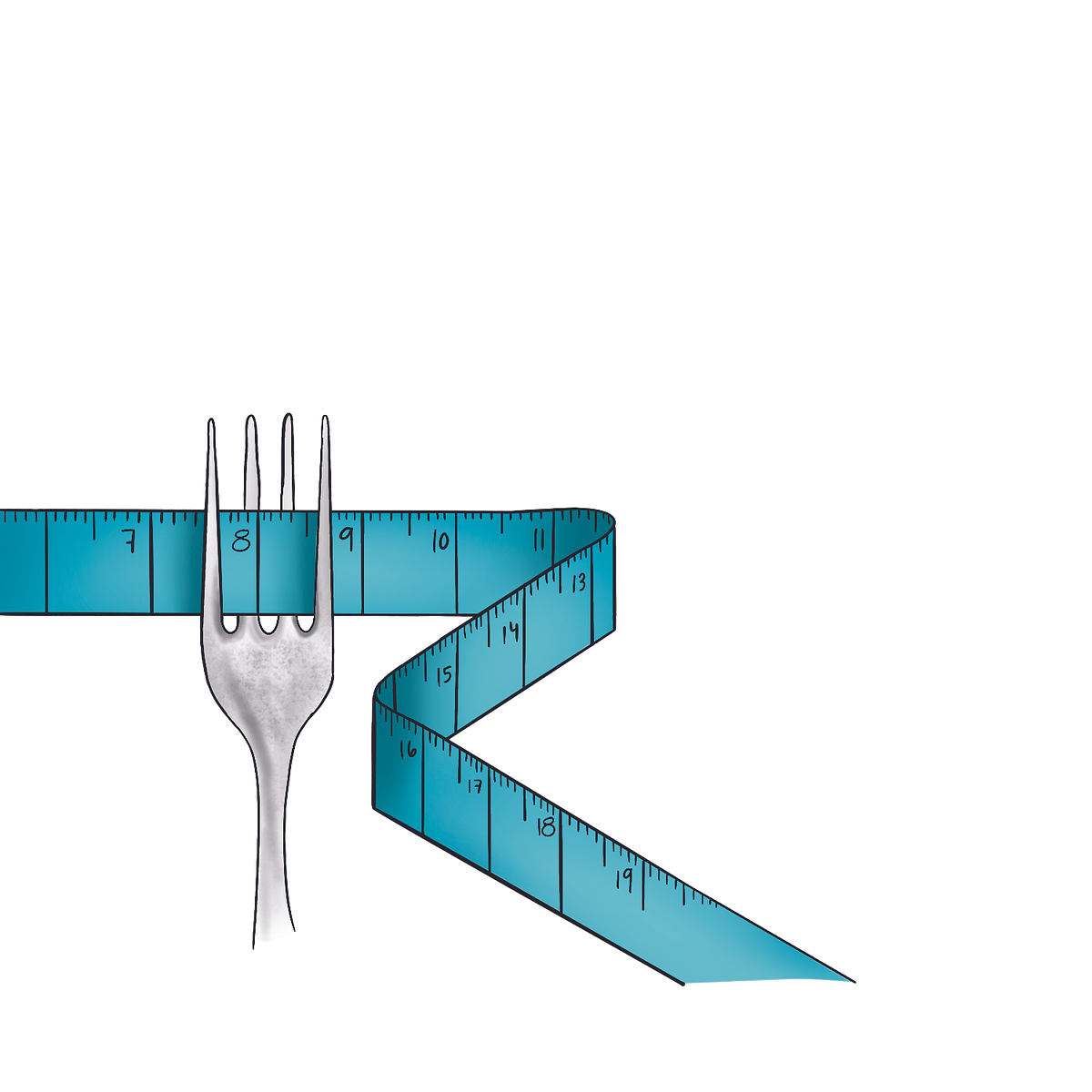Junior Mina Baba stares down at the scale, watching her weight drop lower and lower while her anxiety temporarily rushes away. A few years ago, this constant scale-watching was the way she chose to reassert control in her life after being sexually assaulted.
“I got anorexia when I was 15, and I was about to die,” Baba said. “(Eating disorders) ruined my life. I’m happy to be here now, but I have a friend who lost her life (to) anorexia and bulimia.”
Background
Baba is one of the 28.8 million Americans who struggle with an eating disorder during their lifetime. According to the American Psychiatric Association, eating disorders are severe and persistent disturbances in eating behavior associated with distressing thoughts and emotions. Anorexia nervosa, the act of restricting food to the point of becoming critically underweight, is the most common type of eating disorder. One in twenty people die within five years of diagnosis, while one in five people die within twenty years of diagnosis.
And those most vulnerable to being diagnosed are teens. According to Megan Vo, a Clinical Associate Professor of Stanford Medicine Children’s Health, teenagers are uniquely susceptible to developing eating disorders because they are still in the process of maturing.
“The body and the brain are undergoing this huge change, going from childhood to adulthood, which takes time,” Vo said. “(Teenagers) are uniquely vulnerable to maladaptive behavior, (or) things that aren’t quite normal.”
Psychology teacher Christopher Farina said eating disorders can stem from a combination of biological and environmental factors.
“As with many psychological disorders, there’s a good chance that there’s some kind of genetic predisposition towards those eating disorders, but there’s definitely a big environmental factor as well,” Farina said. “We know this because we see pretty different rates of eating disorders in different cultures or communities. There are definitely social pressures that seem to be causing it.”
Student Perspectives
Junior Rory Akin, a transgender male, said he began restricting his eating to change his body to match his desired gender identity.
“I was not able to access, still to this date, gender-affirming hormones or anything,” Akin said. “(Developing eating disorders) was tied up with my struggles with being trans and a not-super-accepting family situation. I looked too much like a girl, which is something I still struggle with now because I have not been permitted to transition.”
A male senior, who asked to remain anonymous due to personal reasons, said he unintentionally began restricting his eating until it spiraled into a consistent behavior.
“I’ve always been insecure about my body,” he said. “During sophomore year I stopped bringing lunch to school because I was lazy, and then two things happened –– I noticed my body was getting closer to how I wanted it to be, and so I began to restrict further to keep that going, and I (also) got addicted to the feeling of hunger, which was not something I knew one could do.”
The male senior also said he used restrictive eating as a way to relieve his anxiety despite the negative health consequences.
“Obviously I craved food, but it was just so calming when I was hungry. I loved feeling the pain in my stomach and I felt like I could just breathe,” he said. “Once I started eating less, I started losing my hunger signals, including that pain, and I would just get nauseous. It was unpleasant but it just made me want to restrict more to force (the hunger pangs) to happen.”
Baba said she saw limiting her eating as a way to heal her body as a victim of sexual assault.
“I hated the feeling of something inside my body,” Baba said. “I just wanted my body to be empty, and I felt like being empty connected to me being clean.”
In addition, the male senior said regulating his food intake allowed him to regain control over his life.
“Eating disorders are more about using your body as a tool to feel in control about life in general,” he said. “That’s why so many people get obsessions about the scale or calories or macros because it lets you be in control of a part of your life, no matter how insignificant it may seem.”
Farina said eating disorders can affect numerous parts of a person’s life beyond eating habits.
“If you’re not getting the kind of nutrition that you need, you’re not going to be able to perform at your best physically or cognitively,” Farina said.
By restricting her food intake for a prolonged time, when Baba began eating more, she did not know when to stop. Her recovery from anorexia developed into binge-eating disorder — eating large amounts of food in a short timeframe and not being able to stop — and bulimia nervosa — overeating followed by purging, oftentimes by self-inducing vomiting.
Baba also said she could no longer tell if she was hungry or not because her body constantly craved food.
“At one point, I was fasting for an entire week or eating one meal a week,” Baba said. “Then I entered a binging and purging era or a time period where I couldn’t stop eating. I didn’t want to gain weight, so I would then regurgitate it. (Eating disorders) are a cycle that you can’t escape.”
Baba said although she noticed other problems worsening in her life, decreasing her weight became addictive.
“Even though my academics or my relationship with my friends and family were dropping, it didn’t matter to me because I was successful with the number (on the scale) dropping,” Baba said.
Student Athletes
“People perceive with their eyes that if you are leaner (and) thinner, you are going to be faster,” Kofman said. “But that’s not necessarily the case.”
PE teacher David Duran said it is important for the athletic community to be aware of eating disorders and understand how they develop.
“A lot of these issues start when these athletes are young,” Duran said. “If you can recognize it, then figure out exactly what the core of the issue is. Maybe it’s something unrelated to their sport –– something more to do with that home or how they feel about themselves, how they perceive themselves. Start there, but like anything else, education is the best thing for anybody involved.”
Senior wrestler and club weightlifter Caiden Soltesz said athletes often develop eating disorders because of sources outside the sport. He also said unhealthy eating behaviors can be prevented with proper guidance.
“(Eating disorders) mainly affect people in their early years of lifting when they haven’t learned by realistic standards,” Soltesz said. “Gym culture is generally very inclusive and most people go through some sort of food issue, especially early in their journey. Having people who have gone through it to help you definitely helps out a lot.”
Soltsesz said unhealthy eating patterns in athletes are often triggered by extreme images of fit bodies on social media.
“Especially in gym culture, everyone is incredibly active on social media and standards are unrealistically high,” Soltsesz said.
Wrestling coach Jonathan Kessler said he teaches athletes to develop healthy relationships with food.
“It’s important that after practice – you’re losing all (your calories), you’re sweating a ton, using all those nutrients — you put food back into your body because you are exerting a ton of energy,” Kessler said.
Getting Help
Junior Aiden Chen said his friend, who had been struggling with an eating disorder, feared speaking out due to social stigmas.
“When it comes to shame, (there is) a stigma against these sort of mental holdings,” Chen said. “For (my friend) in particular, she always feels bad burdening people (because) she just doesn’t want other people to feel worried about her.”
The male senior also said the cycle of shame and guilt prevented them from reaching out to seek help, and in the process, they developed another issue.
“Eating was so hard for me, but I was so scared of anyone knowing that it was hard and making my parents sad that I just didn’t say anything,” he said.
Baba also said eating disorders are often portrayed incorrectly in the media or maintain stereotypes that paint them as binary.
“Movies and TV shows always portray a middle-class white teenage girl who is struggling with body image,” Baba said. “The media limits (representation) when it comes to people of color or different genders.”
Vo said social media coverage focusing on people’s bodies does not help, either.
“You get all this feedback on your appearance, but it’s not OK,” Vo said. “Whose place is it to give anyone any kind of feedback on something they can’t control?”
The male senior said commenting on a person’s body regardless of if it’s well-intentioned or not can be harmful.
“Even positive comments about bodies are bad,” he said. “I remember I got so many compliments for losing weight and just neutral comments in general and all that did was make things worse.”
On the other hand, Akin said for some, social media does not play a big role in the development of eating disorders, and another misconception is that eating disorders develop because a person wants their body to match mainstream beauty standards.
“A stereotype (of eating disorders) is trying to be more attractive for other people,” Akin said. “That’s something I never experienced, as it is a lot more complicated than that. People looking at social media and seeing Photoshopped models might feel bad about themselves, but that’s not going to be the only thing that precedes significant health issues like eating disorders.”
Derenne said people should not make assumptions about who has an eating disorder. “Sometimes people assume you can tell someone has an eating disorder just by looking at them,” Derenne said. “I see people of all body sizes and shapes who have difficulties with their eating. A lot of times it’s under-recognized because of the stereotypes people hold in their mind.”
Moving Forward
Despite the difficulty of knowing what to say to a struggling friend or family member, Chen said that he still wants to try and support his loved ones as best as he can.
“If they were my friend, I would want to know (their struggles) just so that I could in any way help them,” Chen said. “It’s always important to not only identify a problem for yourself but identify it with other people (since) two heads think better than one.”
Akin said throughout the process, his sister and friends were a big help for him.
“Just being around people who care for you is really important (regarding) any kind of mental health,” Akin said.
In addition, the male senior said communal support is also helpful.
“Other things that have helped is seeing more people who look like me being loved in some way,” the male senior said. “Group sessions, although terrifying at first, are wonderful if you can get anyone to talk because you find out so many things that you have in common with people and you realize how absurd your thoughts are when you see them in other people.”
Vo said it is important for teenagers to acknowledge their value outside of physical appearance.
“What you look like has nothing to do with who you are as a person, how valued you are, what you have to give,” Vo said. “If you hear somebody saying negative self-talk, just say ‘You’re my friend. I love you, and I’m not going to engage.’”





Maria • Oct 2, 2024 at 9:34 pm The Campanile Pick
This a great story! Way better than Cmag…